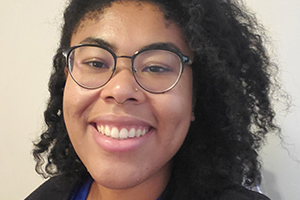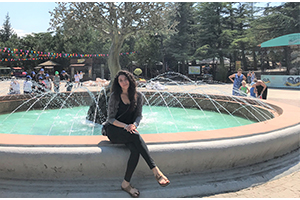Achievements
Diversity in Diplomacy AU’s Payne and Rangel Fellows Explore Careers in Foreign Service

A rising senior and two alumni intent on US Foreign Service careers are one step closer with their selections to the US State Department’s Charles B. Rangel International Affairs and USAID Donald M. Payne International Graduate Fellowship programs.
Janelle Gray, SIS/BA ’21, beat out 1,092 applicants to win one of 15 spots for the Rangel Summer Enrichment Program, a six-week overview of the current issues, trends, career opportunities in international affairs. Tiffany King, SIS/BA ’16, has been selected for the Rangel Graduate Fellowship Program, and Mariam Khorenyan, SPA/BA ’17, will join the Payne Graduate Fellowship Program.
Rangel and Payne were members of Congress from New York and New Jersey, respectively, who were known for their service and leadership in global affairs. The programs named for them promote excellence and diversity in the US Foreign Service, and encourage members of minority groups to apply. Each program funds two years of graduate study, internships, and professional development activities, and if completed, leads to appointment in the Foreign Service.
“The purpose of these leadership development awards is to encourage students to enter these careers,” says Paula Warrick, director of the Office of Merit Awards, which advises students and alumni as they apply for these and other highly-competitive awards. “They still have to pass the oral portion of the foreign service exam to be inducted, but they’ll receive all sorts of special mentoring in skills that will help determine whether they will be able to meet other benchmarks down the road.”
Gray’s interest in the world stems from being part of an immigrant family—her mother is from Jamaica. “If you don’t have that experience of coming from an immigrant family,” Gray says, “you don’t necessarily know how big the world is and how much more there is to learn about it. I wanted to know more.”
She also learned a great deal from her host mother when she was a Gilman Scholar in Kenya. “She was kind of the leader of her community. A widowed single mother in her thirties who had a coffee farm, a tea farm, a business—she was an entrepreneur, providing jobs to a lot of women in her community,” recalls Gray. “She didn’t let us sit down: we picked tea, milked cows. She wanted us to be involved, and it was incredible to see that.”
Gray says becoming a US diplomat means representing all US citizens, and therefore developing foreign service leadership that reflects the nation’s diversity is important. “Representation really matters. Brown and black people like me need to be considered as part of these very important conversations,” she says.
King, a first-generation American whose parents emigrated from Barbados and Guyana, has dreamed of a foreign service career since she was in high school. She’s headed to Georgetown University to earn a master’s degree in the Global Human Development program.

“I know not every American has a passport, but since I was a girl I always had one, and traveling from a young age is what got me interested in the world,” says King, who has spoken both English and Spanish from an early age and has studied Japanese and Chinese.
King has spent time in East Asia, and she thinks China and Japan need a more realistic representation of what the United States actually looks like. “These are homogenous societies,” she observed. “In China I was stared at because I wasn’t white and blonde like a lot of my colleagues. In Asia it’s predominantly white and Asian, and this lack of diversity means they don’t understand that America is a culture of immigrants, and that every nation that is out there we have, represented, here,” King explains.
Khorenyan, who was born in Armenia and emigrated to the US when she was 13, will attend New York University to earn her master’s degree in global affairs with a specialty in transnational security. A former Peace Corps volunteer, Khorenyan says she thought about a career in the foreign service as an undergraduate, “but it never seemed like a possibility because I never saw someone who looked like me speaking about this possibility.”

Khorenyan wants to help change that. “The fellowships all have the same mission in mind: to bring diversity and new voices to the foreign service. So, I want to use my voice, my experience as an immigrant, and my service in the Peace Corps.”
Like Gray and King, Khorenyan says public service has been a recurring theme in her college and adult life. “I want to give back, because I feel I have been given so much—so many incredible opportunities,” Khorenyan says.
These opportunities include—for all three scholars—the chance to show the next generation that a diplomat can look just like they do.